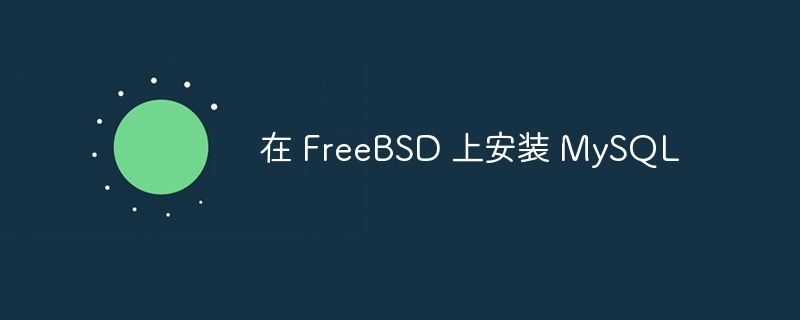Install MySQL on FreeBSD

#MySQL can be installed on FreeBSD using the binary distribution provided by Oracle. The first and easiest way to install MySQL is to use the "mysql-server" and "mysql-client" ports available on the http://www.freebsd.org/ website.
The advantages of using these ports are -
It comes with a working MySQL server and contains all the optimizations enabled and helpful on the user's version of FreeBSD Go to work.
It is automatically configured and built.
The startup script is installed in /usr/local/etc/rc. d.
It enables users to see which files are installed using pkg_info –L.
It also enables users to delete MySQL using pkg_delete if it is no longer needed on the computer.
The process of building MySQL requires GNU make (gmake) to work properly. If GNU make is not available, you must install it before compiling MySQL.
You can use the following command to install the ports system -
# cd /usr/ports/databases/mysql80−server # make ... # cd /usr/ports/databases/mysql80−client # make
The standard port installation will place the server in /usr/local/libexec/mysqld, and the startup script of the MySQL server will be placed in /usr/local/ etc/rc.d/mysql-server.
MySQL server can be installed using the port system using the following code:
Example
# cd /usr/ports/databases/mysql80-server # make deinstall ... # cd /usr/ports/databases/mysql80-client # make deinstall
The above is the detailed content of Install MySQL on FreeBSD. For more information, please follow other related articles on the PHP Chinese website!

Hot AI Tools

Undresser.AI Undress
AI-powered app for creating realistic nude photos

AI Clothes Remover
Online AI tool for removing clothes from photos.

Undress AI Tool
Undress images for free

Clothoff.io
AI clothes remover

AI Hentai Generator
Generate AI Hentai for free.

Hot Article

Hot Tools

Notepad++7.3.1
Easy-to-use and free code editor

SublimeText3 Chinese version
Chinese version, very easy to use

Zend Studio 13.0.1
Powerful PHP integrated development environment

Dreamweaver CS6
Visual web development tools

SublimeText3 Mac version
God-level code editing software (SublimeText3)

Hot Topics
 Reduce the use of MySQL memory in Docker
Mar 04, 2025 pm 03:52 PM
Reduce the use of MySQL memory in Docker
Mar 04, 2025 pm 03:52 PM
This article explores optimizing MySQL memory usage in Docker. It discusses monitoring techniques (Docker stats, Performance Schema, external tools) and configuration strategies. These include Docker memory limits, swapping, and cgroups, alongside
 How to solve the problem of mysql cannot open shared library
Mar 04, 2025 pm 04:01 PM
How to solve the problem of mysql cannot open shared library
Mar 04, 2025 pm 04:01 PM
This article addresses MySQL's "unable to open shared library" error. The issue stems from MySQL's inability to locate necessary shared libraries (.so/.dll files). Solutions involve verifying library installation via the system's package m
 How do you alter a table in MySQL using the ALTER TABLE statement?
Mar 19, 2025 pm 03:51 PM
How do you alter a table in MySQL using the ALTER TABLE statement?
Mar 19, 2025 pm 03:51 PM
The article discusses using MySQL's ALTER TABLE statement to modify tables, including adding/dropping columns, renaming tables/columns, and changing column data types.
 Run MySQl in Linux (with/without podman container with phpmyadmin)
Mar 04, 2025 pm 03:54 PM
Run MySQl in Linux (with/without podman container with phpmyadmin)
Mar 04, 2025 pm 03:54 PM
This article compares installing MySQL on Linux directly versus using Podman containers, with/without phpMyAdmin. It details installation steps for each method, emphasizing Podman's advantages in isolation, portability, and reproducibility, but also
 What is SQLite? Comprehensive overview
Mar 04, 2025 pm 03:55 PM
What is SQLite? Comprehensive overview
Mar 04, 2025 pm 03:55 PM
This article provides a comprehensive overview of SQLite, a self-contained, serverless relational database. It details SQLite's advantages (simplicity, portability, ease of use) and disadvantages (concurrency limitations, scalability challenges). C
 Running multiple MySQL versions on MacOS: A step-by-step guide
Mar 04, 2025 pm 03:49 PM
Running multiple MySQL versions on MacOS: A step-by-step guide
Mar 04, 2025 pm 03:49 PM
This guide demonstrates installing and managing multiple MySQL versions on macOS using Homebrew. It emphasizes using Homebrew to isolate installations, preventing conflicts. The article details installation, starting/stopping services, and best pra
 How do I configure SSL/TLS encryption for MySQL connections?
Mar 18, 2025 pm 12:01 PM
How do I configure SSL/TLS encryption for MySQL connections?
Mar 18, 2025 pm 12:01 PM
Article discusses configuring SSL/TLS encryption for MySQL, including certificate generation and verification. Main issue is using self-signed certificates' security implications.[Character count: 159]
 What are some popular MySQL GUI tools (e.g., MySQL Workbench, phpMyAdmin)?
Mar 21, 2025 pm 06:28 PM
What are some popular MySQL GUI tools (e.g., MySQL Workbench, phpMyAdmin)?
Mar 21, 2025 pm 06:28 PM
Article discusses popular MySQL GUI tools like MySQL Workbench and phpMyAdmin, comparing their features and suitability for beginners and advanced users.[159 characters]






